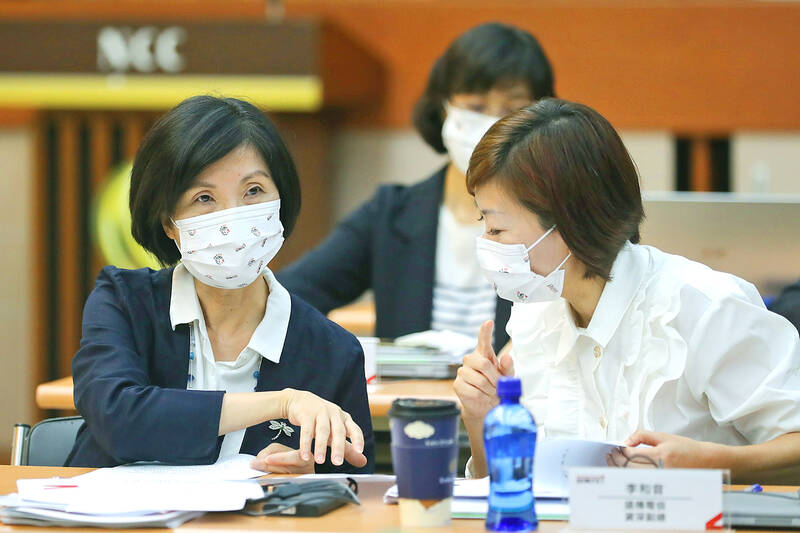With 5G services entering their third year, Far EasTone Telecommunications Co (遠傳電信) is aiming to boost its 5G subscriber penetration rate to 40 percent this year from more than 30 percent last year.
It would be reasonable to see an increase of 10 percentage points this year, Far EasTone president Chee Ching (井琪) said on Wednesday.
Benefiting from an expansion of its 5G subscriber base, the company’s net profit and revenue would grow this year more than last year, Ching said, adding that more 5G subscriptions would constitute one of the key drivers of the growth.

Photo: CNA
Far EasTone has posted a 20 percent increase in average revenue per user (ARPU) from 5G subscribers’ renewals in terms of monthly fees, it said.
The telecom saw its ARPU climb to NT$724 (US$24) from post-paid mobile users in the third quarter of last year, from NT$719 in the second quarter and NT$708 in the third quarter of 2021.
As telecom services have become an integral part of people’s life, Far EasTone’s business would be less affected by the downturn in the economy, compared with consumer electronics companies, Ching said.
“People may cut spending on nonessential items when paychecks shrink, but it is unlikely that they would cancel their telecom services,” she said.
Far EasTone expects capital spending to be lower than last year’s NT$11.1 billion as investment on 5G deployment has peaked, Ching said.
The company also expects revenue from its “new economy” businesses, or nontraditional telecom services, including cloud-based services, 5G private networks and e-commerce services, to rise to 20 percent of total revenue this year, from 19 percent in the first three quarters of last year.
Asked about Far EasTone’s planned acquisition of Asia Pacific Telecom Co (亞太電信), Ching said she expected the merger to take effect in the third quarter at the earliest.
The acquisition is still under review by the National Communications Commission and is subject to the approval of the Fair Trade Commission.
Far EasTone expects the deal to generate synergies within a year.

TAKING STOCK: A Taiwanese cookware firm in Vietnam urged customers to assess inventory or place orders early so shipments can reach the US while tariffs are paused Taiwanese businesses in Vietnam are exploring alternatives after the White House imposed a 46 percent import duty on Vietnamese goods, following US President Donald Trump’s announcement of “reciprocal” tariffs on the US’ trading partners. Lo Shih-liang (羅世良), chairman of Brico Industry Co (裕茂工業), a Taiwanese company that manufactures cast iron cookware and stove components in Vietnam, said that more than 40 percent of his business was tied to the US market, describing the constant US policy shifts as an emotional roller coaster. “I work during the day and stay up all night watching the news. I’ve been following US news until 3am

UNCERTAINTY: Innolux activated a stringent supply chain management mechanism, as it did during the COVID-19 pandemic, to ensure optimal inventory levels for customers Flat-panel display makers AUO Corp (友達) and Innolux Corp (群創) yesterday said that about 12 to 20 percent of their display business is at risk of potential US tariffs and that they would relocate production or shipment destinations to mitigate the levies’ effects. US tariffs would have a direct impact of US$200 million on AUO’s revenue, company chairman Paul Peng (彭雙浪) told reporters on the sidelines of the Touch Taiwan trade show in Taipei yesterday. That would make up about 12 percent of the company’s overall revenue. To cope with the tariff uncertainty, AUO plans to allocate its production to manufacturing facilities in

Six years ago, LVMH’s billionaire CEO Bernard Arnault and US President Donald Trump cut the blue ribbon on a factory in rural Texas that would make designer handbags for Louis Vuitton, one of the world’s best-known luxury brands. However, since the high-profile opening, the factory has faced a host of problems limiting production, 11 former Louis Vuitton employees said. The site has consistently ranked among the worst-performing for Louis Vuitton globally, “significantly” underperforming other facilities, said three former Louis Vuitton workers and a senior industry source, who cited internal rankings shared with staff. The plant’s problems — which have not

COLLABORATION: Given Taiwan’s key position in global supply chains, the US firm is discussing strategies with local partners and clients to deal with global uncertainties Advanced Micro Devices Inc (AMD) yesterday said it is meeting with local ecosystem partners, including Taiwan Semiconductor Manufacturing Co (TSMC, 台積電), to discuss strategies, including long-term manufacturing, to navigate uncertainties such as US tariffs, as Taiwan occupies an important position in global supply chains. AMD chief executive officer Lisa Su (蘇姿丰) told reporters that Taiwan is an important part of the chip designer’s ecosystem and she is discussing with partners and customers in Taiwan to forge strong collaborations on different areas during this critical period. AMD has just become the first artificial-intelligence (AI) server chip customer of TSMC to utilize its advanced